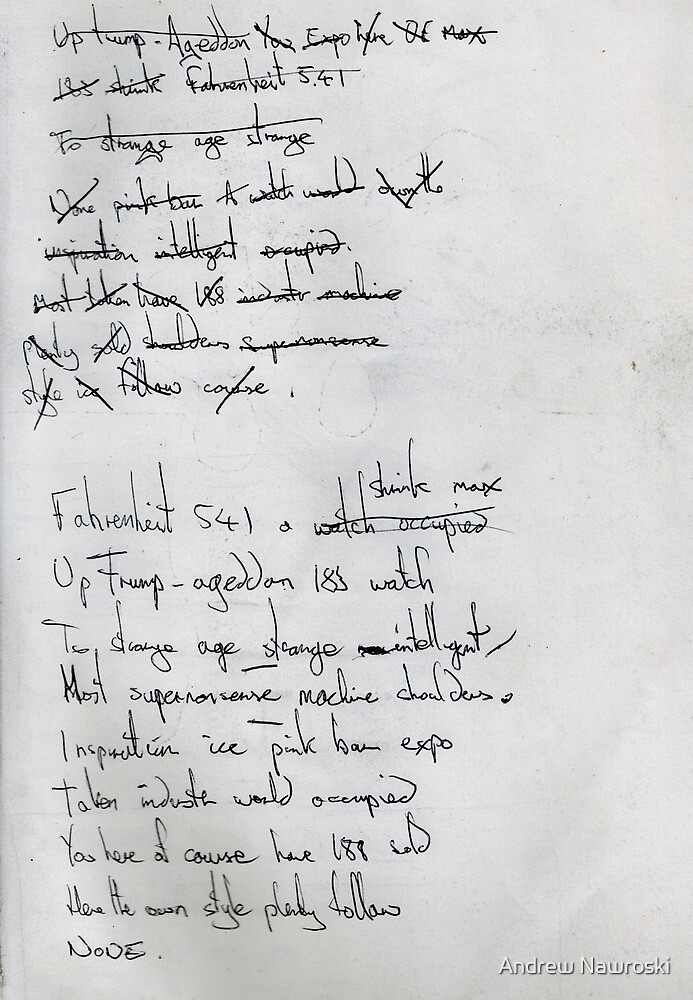
Later, Montag wakes Mildred from her sleep and asks her if she has seen or heard anything about Clarisse McClellan. Jarred by the woman's suicide, Montag returns home and hides the stolen book under his pillow. The woman refuses to leave her house and her books, choosing instead to light a match and burn herself alive. In the following days, while at work with the other firemen ransacking the book-filled house of an old woman and drenching it in kerosene before the inevitable burning, Montag steals a book before any of his coworkers notice.

Montag looks forward to these meetings, and just as he begins to expect them, Clarisse goes missing. She tells him about how her simple pleasures and interests make her an outcast among her peers and how she is forced to go to therapy for her behavior and thoughts. Over the next few days, Clarisse faithfully meets Montag each night as he walks home. Montag's mind is bombarded with Clarisse's subversive thoughts and the memory of his wife's near-death. After the EMTs leave to rescue another overdose victim, Montag goes outside and overhears Clarisse and her family talking about the way life is in this hedonistic, illiterate society. Two uncaring EMTs pump Mildred's stomach, drain her poisoned blood, and fill her with new blood. Montag returns home to find that his wife Mildred has overdosed on sleeping pills, and he calls for medical attention. One fall night while returning from work, he meets his new neighbor, a teenage girl named Clarisse McClellan, whose free-thinking ideals and liberating spirit cause him to question his life and his own perceived happiness. Guy Montag is a fireman employed to burn outlawed books, along with the houses they are hidden in. The novel is divided into three parts: "The Hearth and the Salamander," "The Sieve and the Sand," and "Burning Bright."

The earliest editions make clear that it takes place no earlier than the year 1960. įahrenheit 451 is set in an unspecified city in the year 2049 (according to Ray Bradbury's Coda), though it is written as if set in a distant future. Īdaptations of the novel include François Truffaut's 1966 film, Ramin Bahrani's 2018 film, and two BBC Radio dramatizations.īradbury published a stage play version in 1979 and helped develop a 1984 interactive fiction video game of the same name, as well as a collection of his short stories titled A Pleasure to Burn.

Bradbury was honored with a Spoken Word Grammy nomination for his 1976 audiobook version. It later won the Prometheus "Hall of Fame" Award in 1984 and a "Retro" Hugo Award in 2004. In 1954, Fahrenheit 451 won the American Academy of Arts and Letters Award in Literature and the Commonwealth Club of California Gold Medal. In later years, he described the book as a commentary on how mass media reduces interest in reading literature, and, in a 1994 interview, stated that the book was more relevant during this time than in any other because of political correctness which he described as "the real enemy these days", and as " thought control and freedom of speech control". In a 1956 radio interview, Bradbury said that he wrote Fahrenheit 451 because of his concerns at the time, during the Second Red Scare, about the threat of book burning in the United States.

Bradbury himself was inspired by the Nazi book burnings and by ideological repression in the Soviet Union. People have used this novel to focus on the historical role of book burning. The lead character, Guy Montag, is a fireman who becomes disillusioned with his role of censoring literature and destroying knowledge, eventually quitting his job and committing himself to the preservation of literary and cultural writings. The book's tagline explains the title as "the temperature at which book paper catches fire, and burns": the autoignition temperature of paper. Often regarded as one of his best works, the novel presents a future American society where books are outlawed and "firemen" burn any that are found. Fahrenheit 451 is a 1953 dystopian novel by American writer Ray Bradbury.


 0 kommentar(er)
0 kommentar(er)
